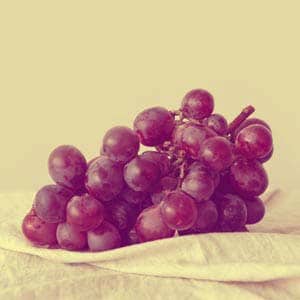Now we know what organic wine means, but what makes organic wine different? Is it the grapes? The fermentation process? There is a lot that goes into organic wine production, and the final product is something that you can feel good about drinking. So let’s explore what makes organic wine unique and why you might want to start incorporating it into your drinking rotation.
Table of Contents
What Makes Organic Wine Different?
Organic wine is made without synthetic fertilizers, pesticides, or herbicides. Organic grape growers don’t even use sulfur dioxide, a common chemical preservative in wine.
So what’s the big deal? Well, there are a few reasons why organic wine can be better for you. First, because no synthetic chemicals are used, the grapes are grown more sustainably, meaning the soil is healthier. As a result, it can better retain moisture, which leads to less erosion. Second of all, organic wines are often lower in sulfites. Sulfites are a preservative that can cause allergic reactions in some people, so organic wines are a safer choice for them.
Finally, many people believe that organic wines taste better than conventional wines; this may be because the grapes can ripen more fully on the vine or because synthetic chemicals have no added flavor.
Do Organic Farmers Follow Sustainable Practices?
The answer to this question is a resounding “yes”! To be certified as organic, farmers must follow a strict set of guidelines for sustainable farming. Some of these guidelines include:

- Using natural methods to control pests and diseases
- Rotating crops to improve soil health
- Conserving water resources
- Using renewable energy sources
Organic farmers are also encouraged to collaborate, forming cooperatives or marketing groups to sell their products collectively, helping keep organic produce prices competitive.
Organic farmers also have to go through an annual inspection to ensure that they meet all of the requirements. If they don’t meet the criteria, certification could be revoked. They may not be allowed to sell their products as organic.
Is The Organic Winemaking Process Different?
There are a few key differences between organic and conventional winemaking. First of all, organic winemakers don’t use any synthetic chemicals or preservatives, so the wines often have a shorter shelf life than traditional wines. Typically, the shelf life of organic wine is about 18 months, compared to 2-3 years for conventional wine.
Organic wines are also made without any added sulfites, which can lead to some problems during winemaking, such as bacterial growth or spoilage. To prevent these problems, organic winemakers often have to be more careful about making and storing their wine.
Finally, organic wines are typically fermented using natural yeasts, leading to different flavor profiles and aromas, which some people prefer. Conventional wines are usually fermented with cultured yeast strains, resulting in a more consistent taste.
Does Organic Wine Taste Different?
There is a lot of debate about whether organic wine tastes different than conventional wine. Some people believe that organic wines have a more earthy flavor, while others think they are fruitier. There is no right or wrong answer – it’s simply a matter of personal preference.
In a recent survey within the USA, most participants stated they preferred the taste of organic wine over conventional wine. However, this may be because organic wines are typically lower in sulfites, which can cause an unpleasant aftertaste in some wines.
When it comes to overall sales of organic wine versus conventional wine, organic wine accounts for less than 1% of the market. However, this number is growing every year, as more and more people are becoming interested in organic products.

Are Organically Grown Grapes Different?
Organically grown grapes are different in a few ways. First of all, they are typically smaller than conventionally grown grapes. The size of an organically grown grape is around 1.5 inches, while a conventionally grown grape is approximately 2.5 inches.
Organically grown grapes also have a higher sugar content than conventionally grown grapes. The sugar content of a conventionally grown grape is approximately 18-20%, while the sugar content of an organically grown grape is around 23-25%.
This higher sugar content means that organic grapes are often used for making dessert wines. Many high-end wineries only use organically grown grapes for their dessert wines.
Is Biodynamic Wine Different Than Organic Wine?
Biodynamic wine is a bit different than organic wine. It is made with certified organic grapes, but the winemaking process is also based on biodynamic principles. This means that the vineyard is treated as a complete ecosystem. Each part of the vineyard works together to create a healthy and sustainable environment.

Biodynamic wines are often considered some of the best-quality wines in the world. They are usually more expensive than organic wines, but many people believe they are worth the price.
Organic wine is made with certified organic grapes, but the winemaking process is not based on biodynamic principles.
Is There a Difference Between Natural Wine and Organic Wine?
There is a lot of debate about the difference between natural wine and organic wine. Some people believe that organic wine is a type of natural wine, while others think there is a big difference between the two.
Organic wine is made with grapes that are grown using certified organic methods. On the other hand, natural wine can be made with any grape and does not have to be certified organic.
Many people believe that natural wine is better than organic wine because it is made with grapes grown more sustainably. However, there is no right or wrong answer – it’s simply a matter of personal preference.
Are Organic Grapes Healthier For You?
There is no evidence that organic grapes are healthier for you than conventionally grown grapes. However, many people believe that they are better for you because they are grown without pesticides or herbicides.
Organic grapes are also GMO-free, meaning they have not been genetically modified. This may be a big selling point for some people, as there is growing concern about the safety of GMOs.

Conventional grapes are sprayed with pesticides and herbicides, which can harm your health. Studies have shown that exposure to these chemicals can increase your risk of cancer and other diseases.
Is Organic Wine Better for the Environment?
Organic wine is better for the environment than conventional wine. Organic farming methods are more sustainable and have less energy than traditional farming methods.
Organically grown grapes also require less water than conventionally grown grapes, which is vital given the current drought conditions in California.
Conventional farming practices are harmful to the environment and damage soil, water, and air quality. Pesticides and herbicides can also contaminate groundwater and cause health problems for people and animals.
Is Drinking Organic Wine Different?
There is no evidence that drinking organic wine differs from drinking conventional wine. However, many people believe that it is better for you because organic wines are made with grapes grown through organic farming.
How Much Organic Wine Is Produced Each Year?

Organic wine is a small percentage of the wine market, but it is growing rapidly. In 2014, organic wine accounted for only 3% of the wine market. However, this number is expected to grow to 5% by 2019.
Natural wines accounted for a much smaller percentage of the market, with only 0.5% of all wine sales in 2014. However, this number is expected to grow to 1%.
Total wine produced each year is roughly 300 million cases. Organic wine accounts for 9 million cases, and natural wine accounts for 5 million cases.
How Many Organic Vineyards Are There?
There are about 2,500 organic vineyards in the United States. This number is multiplying as more and more people are becoming interested in organic wine.
Organic vineyards account for a tiny fraction of the total number of vineyards in the United States, but their popularity is growing. In 2014, organic vineyards accounted for only 2% of all vineyards. However, this number is expected to grow as wine labeled “organic” becomes more popular.
Still wondering why drink organic wine? Read our next post to find out!